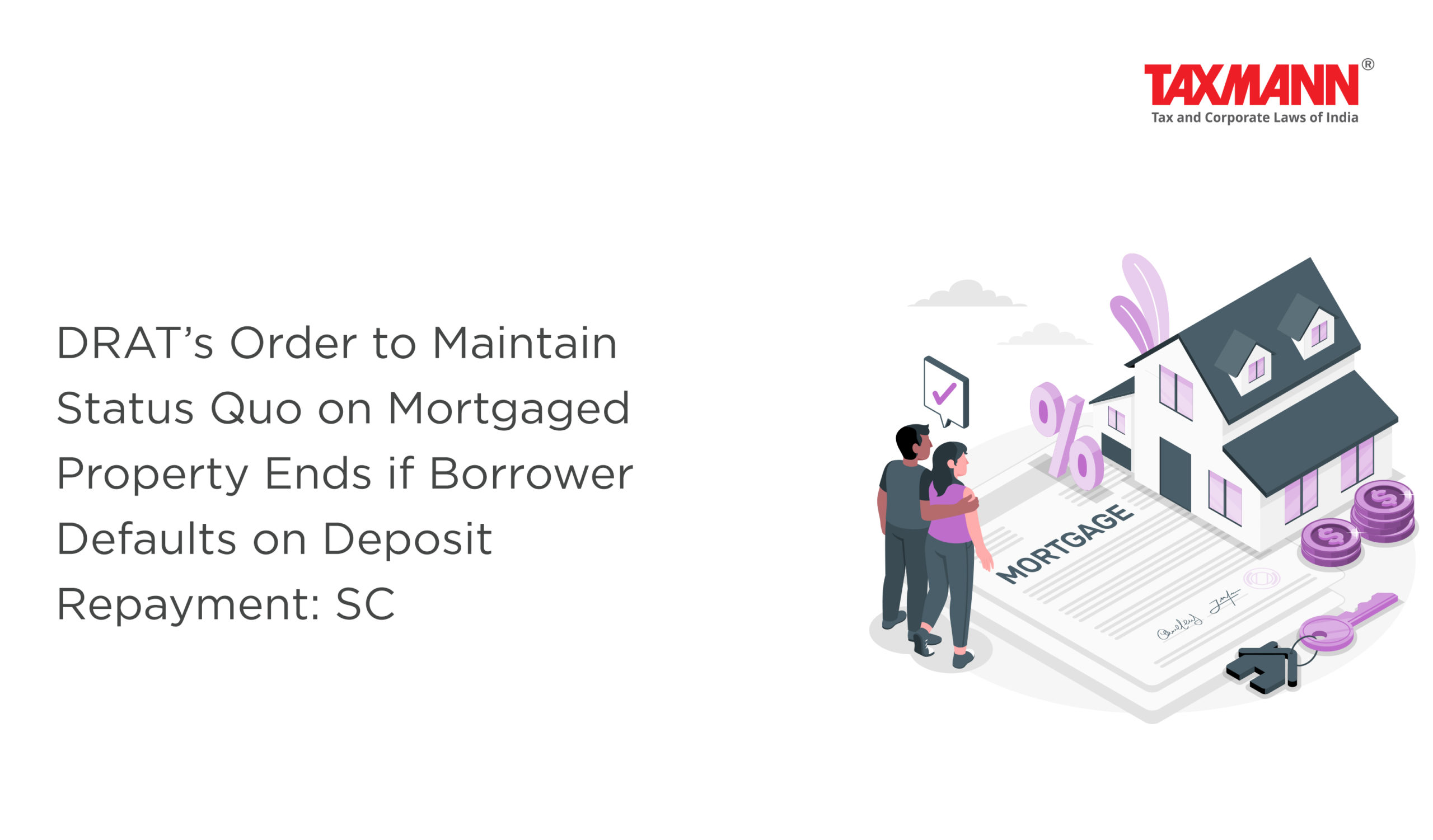DRAT’s Order to Maintain Status Quo on Mortgaged Property Ends if Borrower Defaults on Deposit Repayment: SC
- Blog|News|FEMA & Banking|
- 2 Min Read
- By Taxmann
- |
- Last Updated on 2 June, 2023

Case Details: Anil v. Tata Capital Financial Services Ltd. - [2023] 150 taxmann.com 286 (SC)
Judiciary and Counsel Details
-
- D.Y. Chandrachud, CJ. Pamidighantam Sri Narasimha & J.B. Pardiwala, JJ.
- Garvesh Kabra, AOR & Mrs Pooja Kapra, Adv. for the Petitioner.
- Rajat Katyal & Rahul Sambher, Advs. for the Respondent.
Facts of the Case
In the instant case, the petitioners borrowed an amount from the respondent (i.e. creditor). Upon default in the repayment of the loan amount by the petitioners/borrowers, the District Magistrate passed an order u/s 14 of the SARFAESI Act, 2002 directing the creditors to take possession of the mortgaged property.
The petitioners then filed an application u/s 17 of the SARFAESI Act, 2002 for interim relief and submitted an affidavit before the Debt Recovery Tribunal (DRT), stating that an amount of Rs. 1 crore would be paid in instalments.
The DRT directed the status quo to be maintained with further directions that in case of any default of payments to be made, the order of status quo would stand automatically vacated. The borrowers requested an extension of time to make the payment. However, the DRT dismissed the same.
Being aggrieved by the said order, the petitioners approached the Debt Recovery Appellate Tribunal (DRAT) challenging the said order.
The DRAT directed the petitioners to deposit a total amount of Rs. 1 crore as a pre-deposit. Being aggrieved by the direction to deposit an amount by way of pre-deposit, the petitioners challenged the orders in the writ petition. However, the High Court refused to interfere with the order of DRAT.
Consequently, an appeal was made to the Supreme Court against the order passed by the High Court. It was noted that, apart from an amount of Rs. 20 lakhs that had already been deposited with the DRAT, the petitioners were ready to deposit a demand draft of Rs. 20 lakhs in terms of the order of the DRAT.
Supreme Court Held
The Supreme Court observed that permission was granted to the petitioners to pay an amount of Rs. 20 lakhs to the respondent within three days. Further, the remaining balance of Rs. 60 lakh was to be paid in equal instalments each of Rs. 20 lakhs on or before 31.05.2023.
The Supreme Court held that the interim order would continue to remain in operation subject to the condition that if there was any default on the part of the petitioners in complying with the time schedule, the said interim order would come to an end without further reference to the Supreme Court.
Further, the Supreme Court held that if the petitioners comply with the given time schedule, then it would be for the DRAT to take an appropriate view on whether the petitioners should be granted any further interim direction or not. According, the petition was disposed of.
Disclaimer: The content/information published on the website is only for general information of the user and shall not be construed as legal advice. While the Taxmann has exercised reasonable efforts to ensure the veracity of information/content published, Taxmann shall be under no liability in any manner whatsoever for incorrect information, if any.

Taxmann Publications has a dedicated in-house Research & Editorial Team. This team consists of a team of Chartered Accountants, Company Secretaries, and Lawyers. This team works under the guidance and supervision of editor-in-chief Mr Rakesh Bhargava.
The Research and Editorial Team is responsible for developing reliable and accurate content for the readers. The team follows the six-sigma approach to achieve the benchmark of zero error in its publications and research platforms. The team ensures that the following publication guidelines are thoroughly followed while developing the content:
- The statutory material is obtained only from the authorized and reliable sources
- All the latest developments in the judicial and legislative fields are covered
- Prepare the analytical write-ups on current, controversial, and important issues to help the readers to understand the concept and its implications
- Every content published by Taxmann is complete, accurate and lucid
- All evidence-based statements are supported with proper reference to Section, Circular No., Notification No. or citations
- The golden rules of grammar, style and consistency are thoroughly followed
- Font and size that’s easy to read and remain consistent across all imprint and digital publications are applied



 CA | CS | CMA
CA | CS | CMA
